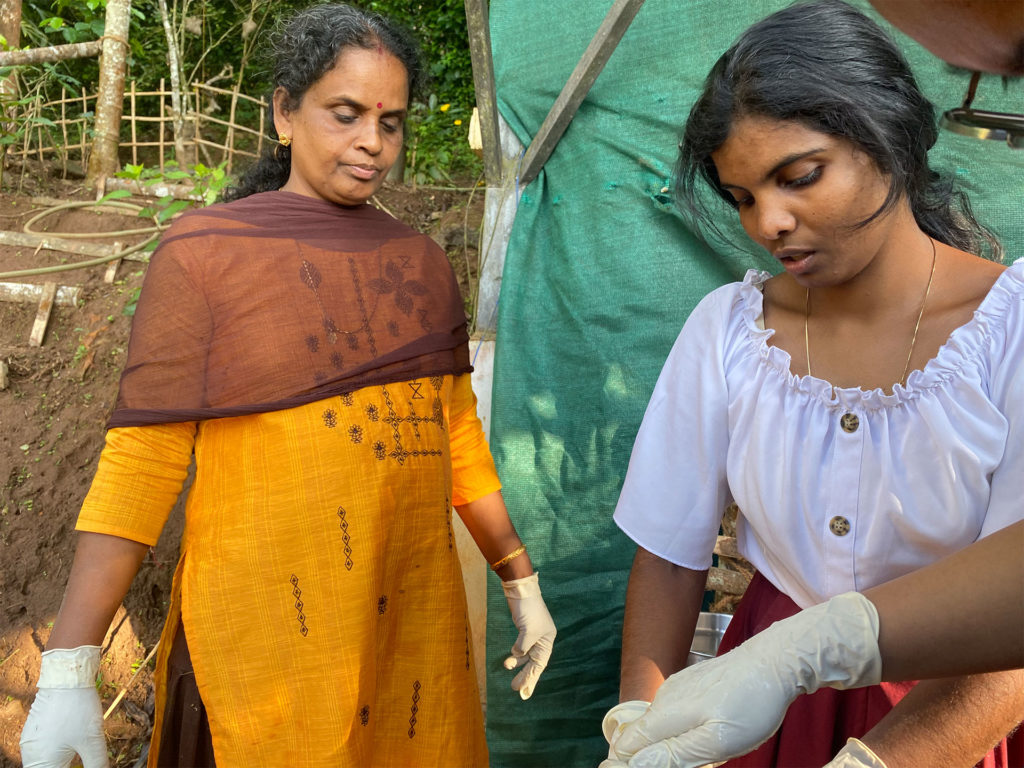Sudha Chechi is a remarkable woman who has defied traditional gender roles to become a rural woman leader and manager of Thanal’s Agroecology Centre in Kerala, India.
Sudha’s journey began at the age of 19. As is customary in many parts of India, she became a homemaker in the early days of her marriage. “My father did not ask about what kind of man I would marry. He only wanted to know if he owned paddy lands,” she recalls. After her marriage, Sudha went to live in her husband’s house where she was required to cook and serve everyone—all in all 14 people in the house each day. If she had to go to her parents’ house, she had to ask permission from her parents-in-law. By age 23, Sudha had had enough. She took her two children and went back to her parents’ home. She didn’t want to be confined to such a life.
Knowing that she had to be self-sufficient, she pursued her interest for farming and agriculture. Having been raised in one of the indigenous communities in their area. She studied various methods and techniques through self-teaching and hands-on experience in their small plot of land. Eventually, her husband supported her.
Sudha’s efforts did not go unnoticed. Eventually, she became a respected woman leader in their local community. In 2016, she got a call from Thanal Trust, which invited her to work part-time as a field officer in the Agroecology Centre to help other women farmers adopt organic and agroecological practices in the farm. A year after, her husband suffered an accident which hindered him from doing any hard labor. Sudha suddenly became the breadwinner of their family.
Sudha’s hard work, dedication and expertise paid off and she was promoted to the position of farm manager of the Agroecology Centre. “When I joined Thanal, I had no idea about preparing organic inputs and what their benefits are. I was mostly interested in practicing agroecology because I wanted healthy food for my family. I learned everything from the trainings I got from Thanal, until I also became a trainer myself.” Every year, Sudha trains around 250 women at the Agroecology Centre on organic methods and practices.
As the overall manager of Thanal’s agroecology farm, Sudha is responsible for overseeing all aspects of the farm’s operations. This includes managing the farm’s yield and agroecology practices, supervising the farm’s workers, and ensuring that the farm is productive. Sudha has also been instrumental in introducing new organic technologies and techniques that have helped increase the farm’s yields and improve the quality of its produce. Her knowledge of medicinal plants on the farm also reflects her interaction with the local tribal population.

As a strong advocate for agroecology, Sudha has helped Thanal raise awareness of its benefits and potential in India. She has worked closely with farmers to encourage them to adopt these practices, and provided training and support to help them make the transition to more sustainable farming methods.
Among the key ways that Sudha has promoted agroecology is through the use of organic fertilisers, such as compost and vermicompost which are produced using natural materials from cow manure and urine and kitchen waste; as well as the use of natural methods and traditional knowledge to promote plant growth and control pests, such as crop rotation and natural pest control to create a more diverse and sustainable agricultural system.
Despite her many achievements, Sudha remains humble and dedicated to her work. She is also a vocal advocate for women’s rights and empowerment, encouraging other women to pursue their dreams and overcome societal barriers. Her leadership and expertise have made her invaluable to the success of Thanal’s Agroecology Centre.
“I am very happy now. I became confident because of my practical experience. I am now able to stand on my own and I wish the same for other women. Every woman should be independent, instead of depending on others to survive,” she said. ###
Women In Agroecology: Towards Pesticide-Free Communities is a continuing storytelling initiative of PAN Asia Pacific and its partners to document stories of rural women who are survivors of pesticide poisoning and/or making the transition to agroecology.
Our contributing partners: Shikkha Shastha Unnayan Karzakram (SHISUK), Bangladesh; Society for Rural Education, India; Gita Pertiwi, Indonesia; Thanal Trust, India; PAN India; and Sustainable Agriculture and Environment Development Association (SAEDA), Laos








Discussion about this post